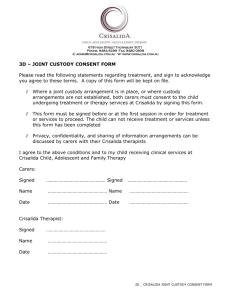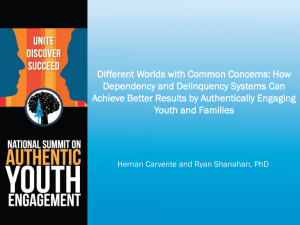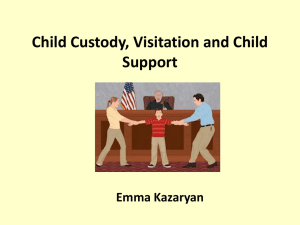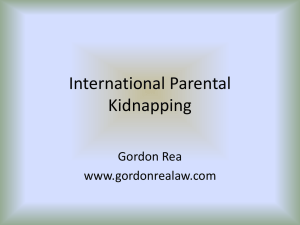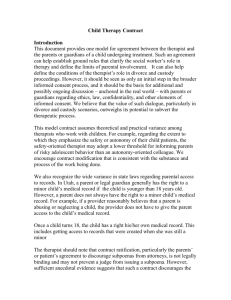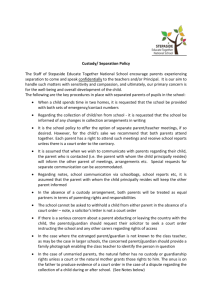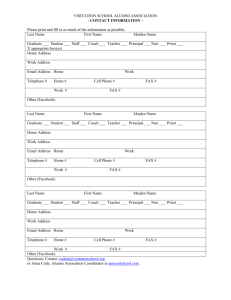View/Open
advertisement
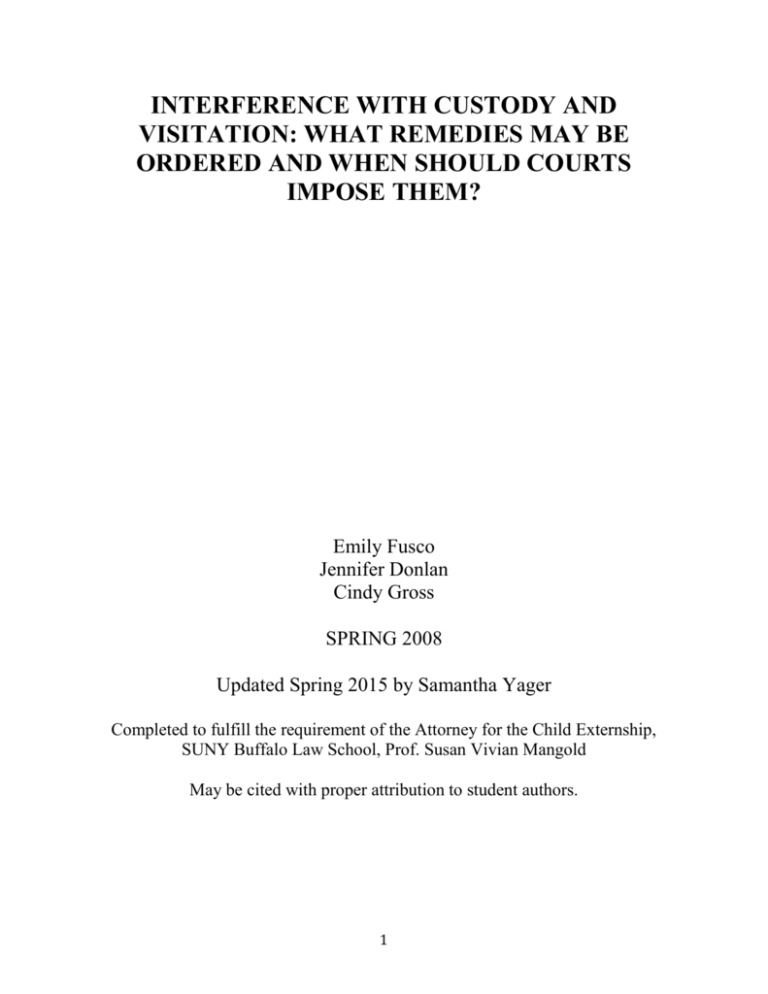
INTERFERENCE WITH CUSTODY AND VISITATION: WHAT REMEDIES MAY BE ORDERED AND WHEN SHOULD COURTS IMPOSE THEM? Emily Fusco Jennifer Donlan Cindy Gross SPRING 2008 Updated Spring 2015 by Samantha Yager Completed to fulfill the requirement of the Attorney for the Child Externship, SUNY Buffalo Law School, Prof. Susan Vivian Mangold May be cited with proper attribution to student authors. 1 Interference with Custody and Visitation: What Remedies May be Ordered and When Should Courts Impose Them? Introduction Many courts have been presented with the question of what to do when there is interference with a non-custodial parent's right to visitation. In this paper, we will first discuss the available remedies that may be applied by courts when presented with acts of custodial interference. In the second part of the paper, we will analyze particular acts of custodial interference, such as denial of visitation, concealment of the child's whereabouts, and creation of a hostile atmosphere. Finally, we will discuss the abuse of the judicial system by parties engaging in frivolous litigation. As a general note, each of the cases discussed may include more than one act of interference or what can be best described as a "pattern of interference" which may result in more than one remedy. As a result, a case or cases may be discussed under several subject areas of the paper. Family Court is given vast discretion to decide what remedy is appropriate for custodial interference. The Fourth Department stated, "Family Court has the responsibility of enforcing its orders and it is in a superior position to determine the extent of punishment necessary to compel future compliance."1 When the Family Court finds a violation of custody or visitation, the remedies it may order include: a monetary fine, imposition of a jail sentence, transfer of custody, denial of maintenance, issuance of an order of protection, placing parties on probation service, direct the filing of a neglect petition, or any other reasonable condition to compel enforcement.2 Additionally, where the court finds that parties are engaging in frivolous litigation, the court may award costs and sanctions as well as equitable remedies. 1 2 Kruszczynski v. Charlap, 508 NYS2d 861, 862 (4th Dept. 1986). 3 N Y Fam. Ct. Law & Prac. §16:48 (2007) 2 I. Civil Contempt as a Remedy Among the remedies available to Family Court is the finding of civil contempt. According to Judiciary Law § 753(A)(3) a party may be held in civil contempt for failing to obey a lawful mandate of the court. Family court Act §156 makes Judiciary Law §753 applicable to family court proceedings. In Labow v. Labow, the court discussed the difference between criminal and civil contempt.3 The court stated, "unlike fines for criminal contempt where deterrence is the aim and the State is the aggrieved party entitled to the award, civil contempt fines are remedial in nature and effect. The award should be formulated not to punish the offender, but solely to compensate and indemnify private complainants."4 The Fourth Department has stated that "[a] finding of civil contempt based on a violation of the court should not be made unless the order violated is clear and explicit and the act complained of is clearly proscribed."5 The Third Department more thoroughly defines civil contempt. In Daniels v. Guntert, the court stated, "to find that civil contempt has occurred, it must be determined that the party charged with the contempt had knowledge of and disobeyed a clear, explicit and lawful order of the court and that offending conduct prejudiced the right of the opposing party."6 In Daniels, in accord with Judiciary Law §773, the court awarded attorneys fees to the respondent. 7 The Courts have stressed that to find contempt, the order must be clear and the party must have full understanding of that order. In Betancourt v. Boughton, the court stated, "the mandate, in turn, must be clearly expressed and it must be demonstrated that the offending conduct 3 Labow v. Labow, 519 NYS2d 652 (1st Dept. 1987). Id. (citing Gompers v. Bucks Stove & Range Co., 221 US 418 (1911)). 5 McPheeters v. McPheeters, 726 NYS2d 897 (4th Dept. 2001)(quoting Matter of King v. King, 671 NYS2d 121 (2d Dept. 1998)). 6 Daniels v. Guntert, 681 NYS2d 880 (3d Dept. 1998). 7 Id. 4 3 'defeated, impaired, impeded, or prejudiced ' a right of the complaining party." 8 In Betancourt, the Third Department upheld one finding of contempt where the mother did not allow the father daily telephone contact with the children. However, the Third Department reversed two other findings of contempt where the record before the court did not specifically "preclude [mother] from seeking an order of protection and/or reporting alleged instances of child abuse."9 The court went on to say, "[t]hus there appears to have been some legitimate confusion regarding the scope of Family Court's . . . order, and inasmuch as that order does not clearly reflect the court's stated intent, we cannot uphold Family Court's finding of contempt."10 Therefore in order for the court to find contempt, the record must be very clear and specific as to what activities are allowed. A. Imposition of a Fine or Attorney's Fees When Contempt is Found When a court finds a party in contempt, the court may impose fines as well as attorney fees. In Costanza v. Costanza, the court stated, "Judiciary Law § 773 permits an aggrieved party to recover costs and expenses, as well as the statutory fine of $250, where no actual damages have been established as a result of contempt . . . Moreover, the reasonable counsel fees which are incurred in connection with an application to punish another for contempt are properly included as an item of the aggrieved party's 'costs and expenses.’” 11 In Gagliardo v. Gagliardo, the Supreme Court imposed a $250 fine on the plaintiff mother for her civil contempt.12 The 8 Betancourt v. Boughton, 611 NYS2d 941, 944 (3d Dept. 1994) (Judiciary Law §753(A); see, Matter of Frandsen v. Frandsen, 594 NYS2d 87). 9 Id. at 945. 10 Id. 11 Costanza v. Costanza, 625 NYS2d 959 (4th Dept. 1995) (see also Lamb v. Arnigone, 785 NYS2d 822 (4th Dept. 2004)). 12 Gagliardo v. Gagliardo, 543 NYS2d 683 (2d Dept. 1989). 4 Second Department went on to state that the motive for the contempt did not matter as long as "such disobedience defeats, impairs, impedes or prejudices the rights of a party." 13 B. Conduct Not Warranting a Finding of Contempt There are situations where the court finds that the conduct of one party is not enough to warrant a finding of contempt. In Palacz v. Palacz, the father's single alleged violation of the visitation order that "apparently [arose] from a conflict between the visitation schedule and the child's academic needs, if established, would be too insubstantial to support the conclusion that the respondent 'defeated, impaired, impeded, or prejudiced' petitioner's visitation rights." 14 II. Change in Custody as Remedy Another remedy available to courts when custodial interference has been found is to order a change in custody. However, the best interest of the child is still the primary concern of courts, even when a party has violated or interfered with visitation rights. In Barnes v. Barnes, the Fourth Department stated, "the Supreme Court erred in granting permanent custody of the parties' children to the plaintiff without a hearing, based on the defendant's violation of previous court orders.15 The best interest of the children should be determined only after a full hearing."16 In Brown v. Marr, Family Court transferred sole custody from the mother to the father after finding a change in circumstances and that it was in the best interest of the child.17 In Brown, the mother had willfully violated an order by denying visitation to the father.18 13 Gagliardo v. Gagliardo, 543 NYS2d 683, 684 (2d Dept. 1989). Palacz v. Palacz, 672 NYS2d 575 (4th Dept. 1998) (quoting Judiciary Law § 753 [A]) 15 Barnes v. Barnes, 651 N YS2d 776 (4th Dept. 1996). 16 Id. 17 Brown v. Marr, 804 NYS2d 181 (4th Dept. 2005). 18 Id. 14 5 In McTighe v. Pearl, the parties originally had joint custody with primary physical custody with the respondent mother.19 The Fourth Department affirmed an award of sole custody to the petitioner father "because of respondent's efforts to exclude petitioner from the child's life and respondent's repeated attempts to sabotage that parent-child relationship."20 The Second and Third Departments have found that even when one party has violated a custody order, they should still be allowed visitation, if it is in the best interest of the child. In Betancourt v. Boughton, the parties were divorced and were awarded joint legal custody.21 The petitioner mother had physical custody and the respondent father was to be given "extensive visitation."22 However, after a custody hearing, Family Court gave physical custody to the respondent father and visitation to the petitioner.23 The court stated, "[t]he record plainly establishes a persistent effort on petitioner's part to prevent the children from seeing and/or establishing a meaningful relationship with respondent and, in our view, petitioner's interference with respondent's visitation rights was sufficiently egregious to warrant a change in custody."24 In Gorsky v. Gorsky, where the respondent mother moved from New York to Georgia without any notice to the petitioner father, the court granted a default judgment transferring custody to the father.25 The Second Department upheld the default judgment, but noted, "we find that the court erred in failing to grant the alternative relief that the appellant [mother] requested, that is, visitation rights with the child of the parties, which was, in principle, not opposed by the 19 McTighe v. Pearl, 778 NYS2d 588 (4th Dept. 2004). Id. 21 Betancourt v. Boughton, 611 NYS2d 941(3d Dept. 1994). 22 Id. at 942. 23 Id. 24 Id. at 943. 25 Gorsky v. Gorsky, 539 NYS2d 423 (2d Dept. 1989) 20 6 petitioner [father], although he desired some limitations.”26 “It is clear from the record that visitation with the appellant [mother] would be in the best interests of the infant child."27 In Meier v. Key-Meier, in deciding whether a change in custody was in the best interest of the child when a parent violates an order, the Third Department stated, "established law dictates that where there is a willful interference with a non-custodial parent's right to visitation, it is deemed to be so inconsistent with the best interests of the children, as to, per se, raise a strong probability that the [offending party] is unfit to act as [a] custodial parent."28 In changing sole custody from the mother to the father, the Court noted "the mother's willful interference with the father's visitation rights reflected poorly on her [mother] fitness as a custodial parent and revealed her disregard of the importance of the girls' relationship with him [father]." 29 III. Incarceration as a Remedy Under Judiciary Law §774(2), the court has the discretion to sentence a party to incarceration for custodial interference. In Kruszczynski v. Charlap, the court ordered the respondent wife to serve weekends in jail for a period of six months for "conduct that was contumacious and calculated to defeat or impede petitioner's visitation rights."30 The court went on to state that such sentence could be terminated after a period of three months when it came up for review and "should conditions at that time so warrant." 31 26 Id. at 424. Id. 28 Meier v. Key-Meier, 828 NYS2d 610, 612 (3d Dept. 2007) (quoting Matter of Ahmad v. Naviwala, 762 NYS2d 125 (2003)). 29 Id. 30 Kruszczynski v. Charlap, 508 NYS2d 861 (4th Dept. 1986). 31 Id. at 862 (see Judiciary Law § 774[2]). 27 7 In Glenn v. Glenn, the respondent father was originally awarded custody.32 However not even two months after the award, the respondent, "with full knowledge of petitioner 's rights thereunder, willfully disobeyed the order of custody/visitation, thereby depriving petitioner and the children visitation from September 1996 until January 1998" by relocating to South Carolina.33 The Court found this behavior so egregious, it was characterized as an "offensive violation."34 As such, the court sentenced the respondent to serve a six-month period of incarceration.35 Based on such incarceration, the court found it to be in the best interests of the children to change custody to the petitioner mother.36 Although Family Court has the discretion to impose a jail sentence on a parent who has willfully violated a visitation order, the court will sometimes suspend the sentence. In Michael A.C. v. Kari Lynn C., Family Court "determined that respondent [mother] had willfully violated a prior order of visitation and imposed a jail term of three days, although the court suspended that sentence."37 However, the Fourth Department upheld the Family Court's finding of willful violation of a court order. The Third Department has similarly suspended jail sentences. In Moran v. Cavanaugh, Family Court found respondent mother had willfully violated the visitation order and sentenced her to ten days in jail.38 "Shortly thereafter, the court suspended the sentence on the condition that she not further violate the visitation order."39 However, the Third Department upheld the finding of civil contempt. 40 32 Glenn v. Glenn, 692 NYS2d 520 (3d Dept. 1999). Id. at 522. 34 Id. 35 Id. 36 Id. 37 Michael A.C. v. Kari Lynn C., 821 NYS2d 710 (4th Dept. 2006). 38 Moran v. Cavanaugh, 834 NYS2d 550 (3d Dept. 2007). 39 Id. at 552. 40 Id. (see also Munster v. Munster, 794 NYS2d 394 (2d Dept. 2005)). 33 8 Apart from suspending a sentence of imprisonment, some courts have reduced sentences. In Barcham-Reichman v. Reichman, the Second Department found a lengthy jail sentence to be too harsh, and reduced the sentence.41 In Barcham-Reichman v. Reichman, Family Court had sentence the father to "serve six months of alternate weekends in jail from Friday evening until Sunday evening."42 The Second Department found that "in view of the fact that the mother's rights were prejudiced by the father's conduct, we conclude that Family Court did not improvidently exercise its discretion in imposing a sentence of incarceration.43 However, we find that the conditional term of six months of alternate weekends in jail is excessive under the circumstances, and we modify the order to reduce that term to three months of alternate weekends in jail." 44 IV. Suspension of Maintenance or Cancellation of Arrears as Remedy Under Domestic Relations Law §241, when a custodial parent who is receiving alimony or spousal support has wrongfully violated visitation rights, courts have the authority to suspend spousal/maintenance payments or cancel arrears.45 An amendment to this section was created in 1986, which provided that nothing in that section should effect child support payments or a ground for cancellation for arrears of child support.46 This amendment means that DRL § 241 cannot provide a defense to the visiting parents refusal to pay child support. However, the statute does permit the suspension of child support payments prospectively where visitation has been wrongfully withheld.47 41 Barcham-Reichman v. Reichman, 672 NYS2d 403, 404 (2d Dept. 1998). Id. 43 Id. 44 Id. (see also Hoistion v. Abrams, 731 NYS2d 863 (2d Dept. 2001)) 45 N.Y. Dom. Rel. Law § 241 (McKinney) 46 N.Y. Dom. Rel. Law § 241 (McKinney), see also Rivera v. Echavarria, 852 NYS2d 236 (2d Dept. 2008). 47 Katz v. Katz, 867 N.Y.S.2d 100, 103 (2d Dept. 2008). 42 9 Rodman v. Friedman, is a rare case where the custodial parent’s interference with visitation was severe enough to warrant the suspension of the visiting parent’s child support obligations pending the resumption of visits.48 On a prior appeal to the First Department, it was found the custodial parents had alienated the child from the visiting parent.49 On the motion to suspend support, the custodial parent’s own submissions led to the conclusion that the alienation had continued.50 The custodial parent was persistent in alienating the visiting parent and refused to accept responsibility for the harm she was causing her child.51 A suspension in child support was found to be required in order to bring about enforcement of the visiting parents right to visitation. 52 V. Remedies for Frivolous Litigation Prior to the mid-l980s, it was unclear what remedies were available when New York courts were confronted with abusive or frivolous litigation: did courts have inherent power to impose sanctions on the guilty party or could courts act only when authorized to do so by a statute or court rule? In 1985, the Appellate Division, Second Department, considered two cases that addressed this question. In Ltown Limited Partnership v. Sire Plan, Inc., the court fined a litigant who had brought six frivolous appeals.53 In Gabrelian v. Gabrelian, the court enjoined a party who had made a series of harassing, vexatious motions.54 In each case, the court relied 48 Rodman v. Friedman, 978 N.Y.S.2d 127 (1st Dept. 2013). Id. at 128. 50 Id. 51 Id. 52 Id. 53 Ltown Limited Partnership v. Sire Plan, Inc., 108 A.D.2d 435 (2d Dept. 1985). 54 Gabrelian v. Gabrelian, 108 A.D.2d 445, 448 (2d Dept. 1985). 49 10 upon the "inherent power[ s] . . . which permit [courts of record] to do all things reasonably necessary for the administration of justice within the scope of their jurisdiction." 55 One year later, the "inherent powers" question was posed to the Court of Appeals. 56 In A.G. Ship, the lower courts had awarded counsel fees after finding that a proceeding was commenced in bad faith to harass the respondent. 57 The issue for the Court in A.G. Ship was "whether a court may, in the absence of legislation authorizing it to do so, impose a sanction upon an attorney or litigant appearing before it who asserts frivolous claims or pursues frivolous pretrial procedures."58 While the Court acknowledged that frivolous litigation was a serious problem, the Court concluded it was "not necessary to determine whether the power of the courts to impose sanctions for frivolous proceedings is inherent to the judicial function or is merely delegable by the Legislature under our Constitution."59 The Court said that the "most practicable" way to deal with the problem of frivolous litigation was through a "plenary rule." 60 Two years later, in 1988, the New York State Office of Court Administration accepted this invitation and promulgated Rule 130. Subsequently, the Court of Appeals said that sanctions can only be imposed either through court rules or legislation. 61 Title 22, Section 130-1.1 of the New York Codes, Rules and Regulations provides that a court can award counsel fees and impose financial sanctions for frivolous conduct in civil actions and proceedings. 62 Specifically, Section 130-1.1, subsection (a) provides: The court, in its discretion, may award to any party or attorney in any civil action or proceeding before the court, except where prohibited by law, costs in the form of reimbursement for actual expenses 55 Id. A.G. Ship Maintenance Corp. v. Lezak, 69 N.Y.2d 1 (1986). 57 Id. at 4. 58 Id. at 2. 59 Id. at 6. 60 Id. 61 See Tewari v. Tsoutsouras, 549 N.E.2d 1143, 75 N.Y.2d 1 (1989). 62 22 N.Y.C.R.R. § 130-1.1. 56 11 reasonably incurred and reasonable attorney's fees, resulting from frivolous conduct as defined in this Part. In addition to or in lieu of awarding costs, the court, in its discretion may impose financial sanctions upon any party or attorney in a civil action or proceeding who engages in frivolous conduct as defined in this Part . . . This Part shall not apply to proceedings in Family Court commenced under article 3, 7 or 8 of the Family Court Act.63 Significantly, § 130 specifically excludes from the court's discretion the authority to impose sanctions under certain articles of the Family Court Act such as Article 3 (Juvenile Delinquency), Article 7 (PINS Proceedings) and Article 8 (Family Offense Proceedings). Therefore, "it is inferred that courts may impose sanctions for frivolous behavior under Article 6 (Custody and Visitation) of the Family Court Act." 64 Although §130-1.1 specifically excludes from the court's discretion the authority to impose sanctions for frivolous conduct under Articles 3, 7 and 8, courts have reviewed litigants' conduct in proceedings under these Articles in the context of Article 6 proceedings to determine if litigants are engaging in a comprehensive pattern of harassment. 65 Rule 130 also authorizes the court to award costs or impose financial sanctions against an attorney or a party to the litigation or against both.66 With regard to orders awarding costs or imposing sanctions, Rule 130 provides: The court may award costs or impose sanctions or both only upon a written decision setting forth the conduct on which the award or imposition is based, the reasons why the court found the conduct to be frivolous, and the reasons why the court found the amount awarded or imposed to be appropriate. An award of costs of the imposition of sanctions or both shall be entered as a judgment of the court.67 63 22 N.Y .C.R.R. § 130-1.l(a). Davis v. Byrd, 2003 NY Slip Op 51314U, 2003 N.Y. Misc. LEXIS 1266 (2003). 65 See Davis, 2003 NY Slip Op 51314U. Although authority to impose sanctions for frivolous conduct under A1ticle 8 is specifically excluded from the court's discretion, nothing in the court rules prohibits this court from reviewing petitioner's conduct under Article 8 cases and determining that they are part of a comprehensive pattern of harassment that may be directly sanctioned under his Article 6 petition. 66 22 N.Y.C.R.R. § 130-1.1(b). 67 22 N.Y.C.R.R. § 130-1.2. 64 12 The Rule also limits the amount of sanctions that can be imposed and provides "[i]n no event shall the amount of sanctions imposed exceed $10,000 for any single occurrence of frivolous conduct." 68 Payment of sanctions by an attorney are to be made to the Lawyers' Fund for Client Protections and payment of sanctions by a party who is not an attorney are to be made to the clerk of the court for transmittal to the commissioner of Taxation and Finance. 69 VI. Other Remedies In addition to the aforementioned remedies, the court may make any other reasonable term or condition in order to gain enforcement. The Third Department has utilized some additional remedies. In Wright v. Wright, the court ordered the respondent, who had also been found in civil contempt for visitation violations, to additionally perform eight weekends of community service.70 In Adams v. Adams, the court found that the plaintiff was not entitled to the remedy of an income deduction because she had frustrated the visitation rights of the defendant father.71 In utilizing these other remedies, the court in Wright stated, "deference should be given to Family Court because it was in a superior position to decide the extent of the punishment required to enforce its orders."72 As it has been shown, courts have a multitude of remedies available when a parent violates a custody or visitation order. As the court in Joye v. Schechter, 460 NYS2d 992, 996 (NY Fam. Ct. 1983) stated, there are "no hard fast rule[s] defining the custodian's duties and responsibilities . . . However, it is clear that the law, at a minimum, requires a custodial parent to do something to encourage and to foster the relationship between the child and the non-custodial 68 Id. 22 N.Y.C.R.R. § 130-1.3. 70 Wright v. Wright, 613 NYS2d 949 (3d Dept. 1994). 71 Adams v. Adams, 459 NYS2d 927 (3d Dept. 1983). 72 Wright, 613 NYS2d at 949. 69 13 parent."73 When the relationship between the child and the non- custodial parent is being hindered, Family Court is given the authority to remedy the situation. The following section of the paper will discuss the particular acts of custodial interference that warrant such remedies. VII. Particular Acts of Custodial Interference A. Denial of Visitation In the following cases, New York courts have held that the denial of visitation by a custodial parent has been so inconsistent with the best interests of the child to warrant a remedy of a change in custody. In Beyer v. Tranelli-Ashe, the Fourth Department changed physical custody from the mother to the father after the court found that the mother had "intentionally and unjustifiably " denied and interfered with the father's visitation rights. 74 The mother filed numerous reports against the father accusing him of physically and sexually abusing the child.75 The reports against the father were deemed unfounded. The court found that the mother had been convicted of two counts of falsely reporting an incident in the second degree in connection with the false abuse allegations.76 The court held that the mother's behavior was not in the best interests of the child and also concluded that the allegations of those false results were traumatic for the child.77 A remedy of a change in custody was held to be in the child's best interests when a mother repeatedly interfered with the father's visitation rights, tried to brand him a pedophile and refused to abide by the Family Court's prior orders.78 Initially the Family Court granted the 73 Joye v. Schechter, 460 NYS2d 992, 996 (NY Fam. Ct. 1983). Beyer v. Tranelli-Ashe, 195 A.D.2d 972 (4th Dept. 1993). 75 Id. 76 The categories organizing the types of interference listed in this paper were drawn from an article that practitioners might find helpful entitled "Interference by Custodian of Child With Non-custodial Parent's Visitation Rights as Ground for Change of Custody." 28 A.L.R. 4th 9. 77 Id. 78 Chase v. Chase, 34 A.D.3d 1077, 1080 (3d Dept. 2006). 74 14 mother sole custody of the couple's six-year-old son and the father was granted visitation. The Family Court did so "with great hesitation" given the mother's "marked weakness" as a parent including her insistence that the father had sexually abused the child despite the lack of any evidence to that effect. 79 The mother did not comply with a scheduled visitation. She informed the school psychologist that the father had sexually abused the child and did not advise him of prior court proceedings finding previous abuse allegations unfounded. The Third Department opined that "Perhaps most disturbing is respondent's readily apparent belief that she is the sole arbiter of what course of action is in her child's best interest and her single-minded pursuit of what she deems appropriate- regardless of whether her actions are in violation of a lawful court order or otherwise harmful to the child." 80 In another example, change of custody was the remedy imposed where a mother allowed a child to negotiate changes in visitation directly with the father. 81 In addition, she discussed proceedings with the child and promised the child that he would be returned to her custody. She also failed to communicate with the father concerning the child's problems at school. 82 The Family Court based its decision to change custody upon findings of fact and testimony of witnesses that the mother had alienated the child from the father. 83 The child had expressed a preference for living with the mother. The Third Department held that the Family Court "had appropriately discounted the child's expressed preferences and directed a new custody arrangement that would repair and enhance the child's relationship with his father . . . ." 84 79 Id. at 1078. Id. at 1080. 81 Whitley v. Leonard, 5 A.D.3d 825 (3d Dept. 2004). 82 Id. at 827. 83 Id. 84 Id. 80 15 In another case, the Third Department reversed the trial court's order changing custody and instead found the mother in contempt for failure to comply with court ordered visitation. 85 The children were ages 10, 12 and 17 at the time of the couple's separation in 2000.86 The children refused to visit their father and also refused to attend court ordered counseling which was designed to facilitate visitation with their father. Despite the Family Court's joint custody order, the children refused to visit with their father since the parties' separation almost four years earlier.87 The children who were 15 and 13 at the time of trial "expressed that they do not love their father and do not want to visit with him." 88 The Third Department did not uphold the sanction of a change of custody because the Supreme Court changed custody without the required plenary hearing involving a "best interests" analysis. 89 As discussed earlier, a jail sentence was imposed and later suspended in Michael A.C. v. Kari Lynn C. The father petitioned the court alleging that the mother had interfered with his visitation rights after she informed him over the telephone that she would not open the door to him when he arrived to pick up the children if he did not comply with an order of discovery that had been issued in a pending support matter.90 The Fourth Department held that the determination that the mother had willfully violated the prior order has "a sound and substantial basis in the record." 91 In Gagliardo v. Gagliardo, a remedy imposing a change in custody was reversed and a fine levied after the Supreme Court transferred custody from the wife to the husband as a result of her denying the father visitation. As referenced in the first section of this paper, the court 85 Labanowski v. Lebanowski, 4 A.D.3d 690 (3d Dept. 2004). Id. 87 Id. 88 Id. at 691. 89 Lebanowski, citing Fam. Ct. Act § 467(b)(ii). 90 Michael A.C. v. Kari Lynn C., 32 A.D.3d at 1174. 91 Id. 86 16 found that the mother's interference with the father's visitation was "violative of the child's best interests."92 The Second Department reversed, holding that she was a loving and attentive mother and that it would be in the best interests of the child to remain in her custody.93 The facts in Gagliardo indicated that the mother was available to care for the young child on a full-time basis and that a transfer of custody to the father would result in placing the child with her paternal grandparents.94 Because the child was an infant and had always lived with the mother, a forced separation from the mother could be traumatic. 95 The Fourth Department imposed a $250 fine on the mother for her denial of visitation and she was cautioned that in the event of further interference she might be subject to additional penalties or a court determination that it would no longer to be in the child 's best interests to remain in her custody.96 B. Concealment of Whereabouts In the following cases, the courts have held that where a custodial parent had moved the child to a new location and concealed their whereabouts from the non-custodial parent, a remedy imposing a change of custody was warranted based on interference with the non- custodial parent's right to visitation. After the mother, without notifying the father, took her children from New York and went to live in a religious commune in Vermont, the Fourth Department transferred custody to the father holding that the change was in the best interests of the children.97 The father had visited the children three times while the children were in the commune but was told by the elders that he was no longer welcome and that they would not 92 Gagliardo v. Gagliardo, 151 A.D.2d at 720. Id. 94 Id. 95 Id. 96 Id. 97 Mahoney v. Marrano, 134 A.D.2d 834 (4th Dept. 1987). 93 17 allow him to take the children for a visit.98 The mother testified that she did not want the children to visit with their father until they had time to be established in the philosophy of the commune. 99 The court found that the mother had delegated her parental authority to the elders of the commune, which was clearly not in the best interests of the children. 100 The controlling factor cited by the court was the "disparate environments" that the parents proposed to raise the children.101 Additionally, the court was concerned that by living in the commune, the children would be insulated from the outside world and were being taught to distrust the world outside the commune. 102 As discussed earlier in Meier, a prior order of custody was modified, thus awarding custody to the father, after the mother who had been awarded sole custody relocated the couple's two daughters to Montana without the father's knowledge or consent.103 The father had been actively involved in the girls' lives and even served as their Girl Scout leader.104 The mother had initially petitioned to relocate to Montana and the father had then filed a petition for custody. 105 The mother then withdrew her petition to relocate and the father withdrew his petition in response.106 However, within days the mother took the girls on an extended vacation to Montana without notification to the father.107 The mother sent the father a letter after he was unable to see the children during his normally scheduled visitation.108 As a result, the mother compensated the 98 Id. Id. 100 Id. 101 Id. at 835. 102 Id. 103 Meier v. Key-Meier, 36 A.D.3d at 1002. 104 Id. 105 Id. 106 Id. 107 Id. 108 Id. 99 18 father for his loss of visitation by allowing him to have the girls for the month of August.109 On the first day of school in September, the father dropped the girls off at school and the mother then relocated to Montana without the father's knowledge or consent.110 The father learned of the girls' relocation from a school official and commenced actions for contempt and modification of the custody order.111 The Appellate Division of the Second Department upheld the finding of contempt and the family court's decision to remand custody to the father. The appellate Court held that the "mother 's willful interference with the father's visitation rights reflected poorly on her fitness as a custodial parent and revealed her disregard of the importance of the girl's relationship with him."112 The Family Court considered a number of factors that would support the need for the mother to relocate including a need for employment, economic, scholastic or otherwise, and held there was no basis for her relocation especially given the girl's close relationship with their father and the presence of extended family on both sides in New York. 113 In a similar case, the Second Department held that a change in custody was warranted and a finding of civil contempt justified where the evidence showed that the mother had moved to Illinois with the children and had willfully interfered with the father's visitation rights.114 At the time of the divorce, the parties agreed that the mother would move no further than Connecticut.115 One month after the divorce, the mother remarried and moved to Illinois without the knowledge or consent of the father.116 The evidence showed that the mother had willfully interfered with the father's visitation rights by telling the administration of the children's school 109 Id. Id. at 1002. 111 Id. at 1003. 112 Id. 113 Id. 114 Entwistle v. Entwistle, 61 A.D.2d 380 (2d Dept. 1978). 115 Id. at 382. 116 Id. 110 19 not to tell the father where the children's educational records were to be sent and getting an unlisted telephone number.117 The father had to hire a private investigator to aid in his efforts of trying to locate his children. The appellate division remanded the case for adjudication of civil contempt and a hearing to determine whether a change of custody was warranted.118 In the following cases, the courts have held that where a custodial parent had moved the child to a new location and concealed their whereabouts from the non-custodial parent, a remedy was warranted based on interference with the non-custodial parent 's right to visitation. In Tekeste B.M v. Zeineba, the Fourth Department vacated a provision transferring custody to the father if the mother did not return the children to Erie County by a certain date from Iowa. 119 The mother had moved to Iowa with the children without giving notice to the father.120 The Court concluded that the father had not asked for an award of custody and that there was no evidence presented at the hearing on the issue of whether a change of custody would be in the best interests of the children.121 The court further opined that "although the unilateral removal of the children from the jurisdiction is a factor for the court's consideration" an award of custody must be based on "the best interests of the children and not a desire to punish recalcitrant parent."122 In Farhi v. Farhi, a father was found in contempt and conditions imposed upon his visitation, when he absconded with his child to the state of Pennsylvania for 28 days as a means of extorting more favorable visitation and financial terms from the mother.123 The father demanded the withdrawal of the contempt proceeding as a condition of returning the child to the 117 Id. Id. 119 Tekeste B.M v. Zeineba, 37 A.D.3d 1152 (4th Dept. 2007). 120 Id. 121 Id. 122 Id. 123 Farhi v. Farhi, 64 A.D.2d 840 (4th Dept. 1978). 118 20 mother.124 The court in attempting to maintain the father-son relationship permitted the father to see the child, but only under "carefully controlled conditions designed to prevent further violations of the court's custody directive."125 In Glenn v. Glenn, a father was incarcerated for six months on a finding of contempt after he relocated to South Carolina without notification to the mother.126 The father was initially awarded custody of the couples' two children following a trial.127 The Family Court said that it felt "bound" to grant custody to the father despite findings of his problems with alcohol, violence and history of his interference with the mother's custodial and visitation rights.128 The Third Department refused to change the Family Court's imposition of a sanction of incarceration against the father.129 The Third Department opined, "Deference should be given to the Family Court because it was in a superior position to decide the extent of the punishment required to enforce its orders."130 C. Creation of Hostile Atmosphere In the following cases, the courts have held that where a custodial parent had displayed a hostile attitude toward or frustrated the non-custodial parent's right to visitation, a change of custody was warranted based on that category of interference. The circumstances surrounding the hostile atmosphere cases in this paper have all resulted in a change in custody with the courts represented determining that it was no longer in the best interests of the child to remain with the non-custodial parent. The analysis surrounding these "hostile atmosphere" cases seem to trigger a change in custody as a result of the impact the hostile behavior has upon the children. While it 124 Id. at 842 Id. 126 Glenn v. Glenn, 262 A.D.2d 885 (3d. Dept. 1999). 127 Id. 128 Id. 129 Id. 130 Id. at 886. 125 21 may be true that one or more of the parents is trying to cause harm or hurt to the other, this kind of behavior seems to be especially troubling to courts as it is not in the best interest of the young children witnessing it. In Beyer v. Tranelli-Ashe, the Fourth Department affirmed a decision of the Family Court that changed the physical custody of a child to the father after the mother filed numerous unfounded reports of physical and sexual abuse against him.131 The Family Court found that the mother "repeatedly and unjustifiably denied and interfered with the father's visitation rights...and regularly violated court orders regarding visitation."132 The mother was convicted of two counts of attempted falsely reporting an incident in connection with the false allegations of abuse. 133 The court held that the investigations associated with those false reports of abuse were traumatic for the child.134 The Second Department, in Lictenfeld, held that modifying a custody order and transferring custody to the father was in best interests of the children. 135 The evidence showed that the mother deliberately interfered with the relationship between the father and the child. In addition, the mother placed the children in jeopardy when, with the children inside the car, she rammed the father's car several times. The court noted that the father, in contrast to the mother, was able to place the children's needs before his own and to "foster an ongoing relationship between the children and the non-custodial parent." 136 In another example, the First Department unanimously affirmed a decision of the Family Court transferring custody to the father. The circumstances in this case were that the mother filed 131 195 A.D.2d 972 (4th Dept. 1993). Id. 133 Id. 134 Id. 135 Lichtenfeld v. Lichtenfeld, 41 A.D.3d 849 (2d Dept. 2007). 136 Id. at 850. 132 22 a number of unfounded complaints of physical abuse and at least one referencing sexual abuse by the father. The father then petitioned for an order of protection requesting court-supervised visitation for the mother and a stop to her "frivolous complaints and harassment." 137 The court issued an order of protection against the mother for one year holding that the mother had "engaged in a pattern of harassment and subjected the child to numerous and sometimes invasive examinations."138 A custody trial was held and an appeal to the first department resulted. The appellate division held that the record supported the family court’s ruling. 139 The court found that the mother completely disregarded the best interests of the child by subjecting the young child to numerous interviews with law enforcement, an invasive gynecological exam and that the mother had coached the child to confirm the false reports to police and medical personnel. The record showed that even in the face of the mother's repeated efforts to create a hostile environment between the parties, the father "consistently attempted to foster a relationship between mother and child."140 Other cases that have resulted in a change of custody as a result of a creation of a hostile atmosphere include: Greene v. Gordon, where custody was transferred to the father after the mother was openly hostile to the father in front of the child, filed baseless violation petitions and instigated a physical altercation with the father's new wife in front of the child.141 In Young v. Young, the court imposed supervised visitation and transferred custody to the father when the mother psychologically poisoned the children to turn them away from their father, making unfounded reports of sexual abuse.142 137 Joseph M v. Rosana R., 32 A.D.3d 725 (1st Dept. 2006). Id. 139 Id. 140 Id. 141 Greene v. Gordon, 7 A.D.3d 528 (2d Dept. 2004). 142 Young v. Young, 212 A.D.2d 114, (2d Dept.1995). 138 23 The court in Young opined that "it is clear that the mother's anger and hostility toward the father has made her unfit to be the custodial parent since her attitude would substantially interfere with her ability to place the needs of the children before her own in fostering a continued relationship with the non-custodial parent."143 The court further stated that one of the primary responsibilities of a custodial parent is to assure meaningful contact with the noncustodial parent.144 VIII. Abuse of the Judicial Process by Engaging in Frivolous Litigation A. Introduction Family law is a unique area of law often characterized by highly emotional contests and the lack of finality inherent in family law cases. The lack of finality stems from the nature of the interests involved in the judgments and the possibility for modification. Courts must permit recurring litigation, giving the parties increased opportunities to file additional claims and prolong the litigation. Moreover, there is a high incidence of pro se litigation in family law cases. Family Court is somewhat unique as compared to other civil courts in that most litigants appear before the court pro se and are not required to pay any fees upon the filing of family court petitions. Consequently, there is little to deter a petitioner from filing excessive and meritless petitions except for the Court's authority to impose sanctions.145 Consequently, family law is uniquely vulnerable to those who would exploit the lack of finality in order to harass or manipulate the other party. As previously discussed, Title 22, Section 1301.1 of the New York Codes, Rules and Regulations provides that a court can award counsel fees and impose financial sanctions for frivolous conduct in civil actions and proceedings. B. What Constitutes Frivolous Litigation? 143 Id. at 115. Id. 145 Davis v. Byrd, 2003 NY Slip Op 51314U, 2003 N.Y. Misc LEXIS 1266 (2003). 144 24 There are three categories of frivolous conduct under §130. Section 130-1.1 subsection (c) provides that conduct is "frivolous" if: (1) it is completely without merit in law and cannot be supported by a reasonable argument for an extension, modification or reversal of existing law; or (2) it is undertaken primarily to delay or prolong the resolution of the litigation, or to harass or maliciously injure another; or (3) it asserts material factual statements that are false. 146 As will be seen below in the discussion of specific family court cases dealing with the imposition of costs and/or sanctions for frivolous conduct, these three categories of frivolous conduct often overlap and certain conduct may be held to constitute one or more of these three categories of frivolous conduct. C. Factors Considered in Determining Whether Conduct is Frivolous It has been recognized that "[t]he goals [of the sanction rules] include preventing the waste of judicial resources, and deterring vexatious litigation and dilatory or malicious litigation tactics." 147 When a court is considering whether to impose sanctions under § 130, the governing standard of proof to be applied is a "fair preponderance of the evidence." 148 Additionally, "the frivolous sanction rules, like any statutory or regulational [sic] penalty provision, must be strictly and narrowly construed "and "[a] corollary of this principle is that a statute or rule which is punitive in nature may not be extended to doubtful situations and that every reasonable doubt . . . should be resolved in favor of [the accused party]." 149 When determining whether the conduct of a party or an attorney comes within one of the three categories of frivolous conduct so as to warrant sanctions, Section 130-1.1(a) provides: 146 22 N.Y.C.R.R. § 130-1.1(c). Smith v. Smith, 2006 N.Y. Misc. LEXIS 2851, 235 N.Y.L.J. 124 (Westchester Co. 2006) (quoting Levy v. Carol Management Corp., 260 A.D.2d 27, 34 (1st Dept. 1999)). 148 Id. 149 Steiner v. Bonhamer, 549 N.Y.S.2d 340 (Sup. Ct, Allegany Co, 1989). 147 25 [T]he court shall consider, among other issues the circumstances under which the conduct took place, including the time available for investigating the legal or factual basis of the conduct, and whether or not the conduct was continued when its lack of legal or factual basis was apparent, or should have been apparent, or was brought to the attention of counsel or the party.150 In addition, courts have considered other factors when determining whether conduct is frivolous and warrants sanctions. In Smith v. Smith, the court granted a husband's motion for the imposition of sanctions under 22 N.Y.C.R.R. § 130- 1.1(a) against his former wife and her attorney for allegedly committing fraud in a court proceeding that sought an emergency order requiring the husband to pay college expenses by withholding material information concerning the sources of funds for meeting those expenses.151 Among the factors the Westchester County Supreme Court considered in Smith were: (a) considerations of fairness and equity, (b) the penalty imposed should be proportionate to the amount sought in the lawsuit, the culpability of the actor's conduct, and the prejudice to the other party, (c) any adverse impact made upon the court system, (d) the party's culpability for the frivolous conduct, and (e) the need to deter both parties and others from engaging in similar conduct.152 In Steiner v. Bonhamer, a case concerning a real estate transaction, the Allegany County Supreme Court denied an application for sanctions after having found no intent to harass, annoy, or inconvenience the adversary parties and no pattern of baseless litigation that would warrant the imposition of sanctions. 153 In making its determination, the court sought to balance two competing policies: "(1) extending to plaintiffs who perceive themselves as aggrieved their 'day in court' and (2) shielding 'innocent' defendants from the expense and anxiety of baseless 150 22 N.Y.C.R.R. § 130-1.1(a) (emphasis added). Smith v. Smith, 2006 N.Y. Misc. LEXIS 2851, 235 N.Y.L.J. 124 (N.Y. Sup. Ct. 2006) 152 Id. 153 Steiner v. Bonhamer, 146 Misc. 2d at 15. 151 26 litigation."154 The Steiner court also outlined additional "pertinent considerations" in determining whether to impose sanctions: 1. Has the "accused" litigant or attorney manifested an intention to harass, annoy or inconvenience his adversaries? 2. Has the accused litigant or attorney manifested a "pattern" of commencing baseless claims? 3. What communication and negotiation, if any, between the parties or their counsel preceded the commencement of the action? 4. What statutory or decisional authority, if any, has the accused litigant or attorney cited in support of his claims? 5. Are the facts of the case clear and not in dispute or is there a complex fact pattern clouded by several versions of what happened? 6. In balancing all of the pertinent factors and exercising the court's discretion, what remedy, if any, do fairness and equity dictate?155 D. Hearing Must be Afforded Prior to the Imposition of Sanctions and Required Contents of Orders Imposing Sanctions Section 130-1.1(d) provides that an award of costs or the imposition of sanctions may be made either sua sponte, on the court's own motion, or upon the motion of a party. 156 The form of the hearing "shall depend upon the nature of the conduct and the circumstances of the case."157 In addition to the hearing requirement, the court must also issue a written decision describing the specific objectionable conduct, the reasons why sanctions were imposed, and 154 Id. at 13. Id. at 14. 156 22 N.Y.C.R.R. § 130-1.1(d). 157 Id. 155 27 reasons why the amount of the sanctions is appropriate. 158 In Schernmerhorn v. Quinette, the petitioner father appealed from an order by the Family Court of Washington County which required the father to pay $3,000 as reimbursement for his assigned counsel and ordered that no further petition filed by the father could be scheduled for a court appearance unless a judge first reviewed it for merit where the father had filed two petitions seeking custody and visitation with his son and failed to appear in court. 159 The Schermerhorn Court concluded "[w]ithout any record explanation of how petitioner's conduct was egregious and constituted an abuse of the judicial process, we must strike the portion of the Family Court's order requiring prior judicial review of any future petitions filed by petitioner." 160 The Court also reversed the portion of the order requiring the father to pay $3,000 for his assigned counsel because the order failed to indicate the conduct creating the basis for sanctions, reasons why the court found this conduct frivolous, and a justification for the amount imposed as sanctions. 161 E. Remedies for Frivolous Conduct 1. Award of Costs and/or Financial Sanctions Against an Attorney and/or Party Resulting from Frivolous conduct As previously discussed, there are three categories of frivolous conduct under § 1301.1(c). Below is a discussion of cases under each of these three categories. 158 22 N.Y.C.R.R. § 130-1.2. Schernmerhorn v. Quinette, 812 N.Y.S.2d 698 (3d Dept. 2006). 160 Id. 161 Id.; see also Berrocales v. Idels, 615 N.Y.S.2d 756 (2d Dept. 1994) (record contained no proof that the father was given a reasonable opportunity to be heard prior to Family Court's imposition of a monetary sanction and Family Court did not state any reason why it found the amount awarded or imposed was proper). 159 28 a) For Conduct Completely without Merit in Law and Which Cannot Be Supported by a Reasonable Argument for an Extension, Modification or Reversal of Existing Law The first category of frivolous conduct under § 130-1.1(c)(I) is conduct that is completely without merit in law and cannot be supported by a reasonable argument for an extension, modification or reversal of existing law. In Laing v. Laing, the Second Department affirmed an order of the Kings County Family Court which granted the father's motion for an award of sanctions against the mother and her attorney in connection with the mother's motion to hold the father in contempt.162 Laing involved a custody proceeding pursuant to Article 6 of the Family Court Act. 163 The Court held that sanctions for the mother and her attorney were appropriate where they both knew there was no basis in law or fact to support the petition or the contempt motion.164 Moreover, the Court noted that the mother and her attorney had submitted to the court a petition, which purported to be verified under oath by the mother, but which she later admitted bore another person's signature. 165 The petition also contained allegations that the mother admitted during cross-examination were false. 166 b) For Conduct that is Undertaken Primarily to Delay or Prolong the Resolution of the Litigation, or to Harass or Maliciously Injure Another The second category of frivolous conduct under § 130-1.1(c)(2) is conduct that is undertaken primarily to delay or prolong the resolution of the litigation, or to harass or maliciously injure another. 162 Laing v. Laing, 690 N.Y.S.2d 701 (2d Dept. 1999). 261 A.D.2d at 622. 164 Id. 165 Id. 166 Id. 163 29 In the case of Crisafulli v. Anderson, the Fourth Department reversed an order of an Oswego County Family Court, which denied respondent father's motion seeking an award of attorney's fees, and the imposition of sanctions. 167 In Crisafulli, the petitioner mother sought to suspend respondent father's unsupervised visitation with the parties' then 2-year-old daughter based on allegations that the father had sexually abused the child.168 Following a hearing, the Family Court found that the mother had "fabricated the allegations of sexual abuse in a deliberate attempt to alienate the child from [the father] and thwart [the father's] visitation rights."169 Consequently, Family Court denied the mother's petition and granted the father's cross petition to transfer custody of the child to him, subject to the child's supervised visitation with the mother.170 In a subsequent order, however, Family Court denied the father's motion seeking an award of attorney's fees and costs and the imposition of sanctions based on the mother's frivolous conduct. 171 In Crisafulli, the Fourth Department found that Family Court's denial of the father's motion was "inconsistent with the court's finding that [the mother's] allegations of sexual abuse against [the father] were totally without merit and evidentiary support and indeed had been fabricated" and that the mother's "fabrication of scandalous allegations of sexual abuse" constituted frivolous conduct under § 130-1.1(c)(2). 172 Therefore, the Court concluded that Family court abused its discretion in denying the father's motion and remitted the matter to determine the appropriate amount of attorney's fees, costs, and sanctions the father was entitled to. 173 167 747 N.Y.S.2d 816 (4th Dept. 2002). Id. 169 Id. 170 Id. 171 Id. at 817. 172 Id. 173 Id. 168 30 In the case of Blackmore v. Blackmore, the Third Department, held that a Madison County Family Court did not abuse its discretion by imposing sanctions for attorney's fees against a father.174 The parties in Blackmore were previously divorced.175 The mother had been awarded custody of the parties' four children and the father was given set visitation.176 Subsequently, the father brought four separate proceedings alleging visitation violations by the mother and all four were later dismissed as "utterly lacking in merit."177 Thereafter, the father brought another application alleging again that the mother had violated terms of visitation.178 Following a hearing, the Family Court dismissed the petition and imposed sanctions in the form of attorney's fees against the father. 179 In Blackmore, the Third Department concluded "the fact that [the father] made five meritless violation applications in a one-year period amply supports Family Court's findings that [the father] had frivolously prolonged this litigation, harassed [the mother] by doing so, and compelled [the mother] to incur unnecessary legal expenses." 180 Accordingly, the Court held that the Family Court did not abuse its discretion by imposing sanctions against the father. 181 Appellate courts have also applied § 130 to frivolous conduct on appeal. In the case of DeRuzzio v. DeRuzzio, the Third Department, affirmed both Supreme Court and Family Court orders imposing sanctions on the husband and imposed sanctions against the husband on the 174 Blackmore v. Blackmore, 761 N.Y.S.2d 355 (3d Dept. 2003). Id. at 356. 176 Id. 177 Id. 178 Id. 179 Id. 180 Id. 181 Id.; see also Strong v. Eamtrakul, 243 A.D.2d 296, 681 N .Y.S.2d 227 (1st Dept. 1997) (record supports Family Court's findings that respondent's conduct in preventing petitioner from visiting the parties' child and in bringing stay applications that were completely without merit was undertaken to harass petitioner by forcing him to incur legal fees and warrants the $7,500 attorney's fee award). 175 31 appeal.182 The Supreme Court had ordered the husband to pay the wife $950 for attorney's fees expended in opposing the husband's motion for reconsideration of an earlier order which referred issues of child custody and visitation to Family Court. 183 Shortly thereafter, the Family Court found that the husband and his attorney "engaged in disingenuous conduct and utilized false allegations to obtain and serve an order to show cause seeking to restrain [the wife] from vacationing in California with the parties' children." 184 Although the order to show cause was withdrawn on its return date, the Family Court ordered the husband to pay the wife $1,000 for attorney's fees and $200 for costs, and it also ordered the husband 's attorney to pay $500 to the Lawyers' Fund for Client Protection. 185 On appeal, the Third Department concluded that neither Supreme Court nor Family Court had abused its discretion in imposing sanctions on the husband.186 The Court went on to note that "this Court has discretion to sanction where it finds that an appeal 'is part of a continuing effort' by one party 'to harass or maliciously injure' another party."187 The Court found that the present appeals were" continuations of the underlying protracted and frivolous litigation pursued by [the husband] undeterred by the repeated sanctions of incarceration and monetary penalties imposed by Supreme Court and Family Court" and that the husband's contentions on appeal were "part of a continuing effort to delay the divorce action and harass [the wife]." 188 Accordingly, the Court imposed sanctions of $500 against the husband and $500 against the husband 's attorney and noted "[t]hese amounts are appropriate in light of the history of [the husband 's] frivolous conduct in this protracted litigation, counsel's ill-advised facilitation of [the husband's] 182 731 N.Y.S.2d 775 (3d Dept. 2001). Id. at 776. 184 Id. 185 Id. 186 Id. 187 Id. at 777. 188 Id. at 777. 183 32 prosecution of these appeals, and the fact that neither [of them] have been deterred by the penalties imposed in the past by the trial courts." 189 c) For Asserting Material Factual Statements that are False The third category of frivolous conduct under § 130- 1.1(c)(3) is conduct that asserts material factual statements that are false. As the following discussion of cases falling under this category of frivolous conduct will illustrate, this third category of frivolous conduct may overlap with other categories of frivolous conduct. As previously discussed, in Crisafulli, the Fourth Department held that a mother’s fabrication of scandalous allegations of sexual abuse against the father constituted frivolous conduct pursuant to § 130-1.1(c)(2). 190 The Crisafulli Court had also found that the mother's allegations of sexual abuse against the father constituted frivolous conduct under § 13-1.1(c)(3) in that "it assert[ed] material factual statements that [were] false. 191 Also previously discussed was the case of Smith v. Smith. In Smith, the court granted a husband's motion for the imposition of sanctions under 22 N.Y.C.R.R. § 130- 1.1(a) against his former wife and her attorney for allegedly committing fraud in a court proceeding that sought an emergency order requiring the husband to pay college expenses by withholding material information concerning the sources of funds for meeting those expenses.192 The Smith Court stated that "offering false material information to a Court is not only a separate class of frivolous conduct [under 22 N.Y.C.R.R. § 130-1.1(c)(3)], but it is a type of affirmative act that comes within the first category of that provision." 193 The Court went on to note that '"[w]hile [almost] 189 Id. Crisafulli, 747 N.Y.S.2d at 817. 191 Id. 192 Smith v. Smith, 2006 N.Y. Misc. LEXIS 2851, 235 N.Y.L.J. 124 (Sup. Ct. Westchester Co. 2006). 193 Id. (citing to Sanders v. Copley, 194 A.D.2d 85, 88, 605 N.Y.S.2d 281 (1st Dept. 1993) ("Nothing could more aptly be described as conduct 'completely without merit in . . . fact' than the giving of sworn testimony or providing an affidavit, knowing the same to be false, on a material issue.")). 190 33 all of the reported decisions on the impositions of sanctions deal with an affirmative act, found to be frivolous . . . omission may amount to frivolous conduct, sufficient to warrant the imposition of sanctions in a proper case."'194 2. Court Permission Required Before Re-Filing Any Petitions and/or Motions In addition to the availability of financial sanctions and awards of attorney 's fees for frivolous conduct in civil actions and proceedings under 22 N.Y.C.R .R. § 130-1.1, courts may impose other equitable remedies for frivolous conduct. One such remedy is a requirement for court permission before re-filing any petitions or motions. In Simpson v. Ptaszynska, the Second Department affirmed a Kings County Family Court order directing the father to seek permission of the court before re-filing any petition or motion.195 The Family Court had denied the father's petition and motion to modify an existing order of custody and visitation for failing to provide evidence to demonstrate a change of circumstances warrant such.196 The Simpson Court noted "while public policy mandates free access to the courts, ' when a litigant is abusing the judicial process by hagriding [sic] individuals solely out of ill will or spite, equity may enjoin such vexatious litigation "' and concluded that the Family Court had properly directed the father to seek permission of the court before re-filing any petitions or motions.197 Court orders requiring individuals to seek consent of the law guardian or certification from counsel that factual allegations and claims were not frivolous prior to the filing of any 194 Id. (quoting Daguaro v. Bratke, 145 Misc. 2d 904, 909, 548 N.Y.S.2d 418 (N.Y.C. Civ. Ct. 1989)). Simpson v. Ptaszynska, 836 N.Y.S.2d 419 (2d Dept. 2007). 196 Id. 195 Id. at 420; see also Pignataro v. Davis, 8 A.D.3d 487, 778 N.Y.S.2d 528 (2d Dept. 2004) (affirmed order prohibiting mother from filing further petitions or motions regarding custody or visitation without the prior written permission of the family court where all three petitions filed by the mother demonstrated the mother 's continuing hostility toward the father, and her propensity for commencing litigation over minor infractions). 197 34 petitions or motions, however, have not been upheld. In Shreve v. Shreve, the Fourth Department vacated a provision of an Allegany County Family Court order providing that a father could not file any more petitions in that court without the consent of the law guardian.198 In Shreve, the Family Court was "exasperated by [the father's] filing of numerous petitions in a short period of time in this custody and visitation case."199 The Fourth Department concluded that "[w]hile the court may have properly restricted [the father] from filing new petitions until leave of the court was obtained or unless he was represented . . . the court erred in ordering [him] not to file any petitions . . . without the consent of the law guardian." 200 The Court stated that "[t]he law guardian is the appointed advocate for the child, whose interests are separate from those of either parent" and that the law guardian "should not at the same time be required, in a quasi-judicial capacity, to pass upon the merits of [the father's] petitions. " 201 Similarly, in Madhu S. v. Taijwait S., the Second Department vacated a provision of a Kings County Family Court order which prohibited a father from filing any further petitions, applications, or motions relating to his wife or children without certification form his attorney that the factual allegations and claims asserted therein were not frivolous as defined in 22 N.Y.C.R.R. § 130-1.1(c).202 The Court noted that "the Family Court itself should be able to assess whether any future proposed filings of the father are frivolous" and concluded "[t]o impose the additional requirement that the father engage counsel to investigate the bona fides of his allegations could, as a practical matter, impose an unwarranted financial restriction on the father's access to the courts." 203 198 645 N.Y.S.2d 198 (4th Dept. 1996). Id. 200 Id. 201 Id. 202 Madhu S. v. Taijwait S., 788 N.Y.S.2d 171 (2d Dept. 2005). 203 Id. at 173. 199 35 Conclusion Throughout this paper, the various remedies Family Courts may apply when presented with acts of custodial interference have been discussed. Among the remedies discussed were civil contempt, the imposition of monetary fines and/or costs for attorney's fees, change in custody, incarceration, and suspension of maintenance. Particular acts of custodial interference, including denial of visitation, concealment of the child's whereabouts, and creation of a hostile atmosphere were also analyzed. Finally, Family Courts' authority to impose costs and/or sanctions and equitable remedies for frivolous litigation was detailed. Examination of these issues has revealed that there are numerous and sufficient remedies available to Family Courts and litigants confronted with acts of custodial interference and frivolous litigation. Often, these acts occur in a pattern and can result in the imposition of more than one type of remedy. Statutory requirements and the best interest of the child play a key role in guiding courts as to when conduct warrant s a remedy. 36
